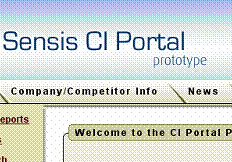Sensis turns gaze inward

The portal and integrated search engine -- called "Ripple" -- is set for full rollout on 14 February after being in development for around 16 months, Sensis managers told ZDNet Australia. A prototype is currently operating within the organisation.
Sensis recently recruited a competitive intelligence manager and analyst to help deliver the project. The new appointees -- who will work with Sensis' existing competitive intelligence team -- will help determine what content will be available to users of Ripple.
As part of the project, Sensis has widened staff access to information held on its servers -- including a mass of market reports and company data -- through the search engine facility.
Julia Mason, group manager of corporate strategy at Sensis, conceded there was room to improve management of information at the organisation. "We do have silos of information," she said.
 |
| Click to enlarge |
However, Ripple will not be so intrusive as to list information held on local drives and e-mail, a policy consistent with Sensis' internal policies.
"[Building an enterprise search engine] requires careful management because you are actually going into the network of information that people have stored up for a long time," Mason said.
"So you need to talk to them about it, and cajole them about it, but I think you'll find once you're offering them access to other people's information, they're more likely to give you theirs."
The search engine is based on technology developed by Norwegian company Fast, the same provider used to deliver Sensis' consumer product, sensis.com.au. Factiva is supplying a real-time news feed, while a content management system is based on FatWire Software.
Mason described Ripple as a competitive intelligence initiative to help Sensis predict market trends as it combats local and international opposition in the search market. For example, it could be used by Sensis' finance department to identify merger and acquisition targets.
"We need to make data-driven decisions. Not decisions based on gut feel," said Mason. With the Ripple prototype in place, more decisions are now being based on hard research, she added.
Sensis is in a growth phase, according to Mason, with parent company Telstra's recent acquisitions of properties like the Trading Post. Needing to grow to stay competitive, Sensis required a predictive capability to identify market opportunities, as well as merger and acquisition opportunities, she said.
"[What we] wanted was for analysts, research staff and users to be able to spend less time looking for raw data and more time developing valuable insight."
Ripple would help share intelligence among Sensis and drive an external company view, she said.
It would help salespeople create views of the external environment by pooling data on customers and their industries, according to Mason.
As well as providing a real-time news feed and CMS, Ripple also provides a "research kiosk" allowing employees to find information they would previously request from a Sensis analyst. Not only would this reduce the number of ad-hoc requests to Sensis analysts, it would improve the accuracy of responses, according to Mason.
One of the problems that led to approval of the project was the realisation Sensis analysts could sometimes give different responses to the same query, according to Mason.
Access to Ripple features would be available to most staff, Mason said, allowing them to share ideas via the portal's discussion forums.
Sensis would achieve some cost savings from the Ripple implementation as a result of the introduction of a centralised data source, Mason said. The number of staff subscribing to the same research publication would be reduced and cross-over in staff roles would also be cut.